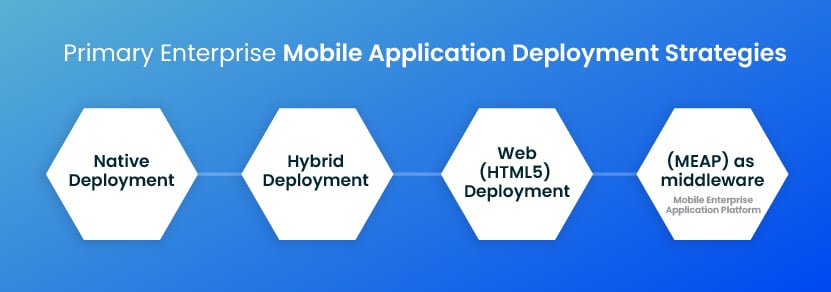Enterprise Mobile Application Deployment Strategies You Can Use

The evolution of smartphones and tablets has revolutionized the way we interact with enterprise systems. Smartphones, in particular, have not only changed our communication methods but have also introduced features like GPS, cameras, and scanners, altering the landscape of business processes within organizations. This underscores the critical role of mobile technology in today's enterprises, as it facilitates remote access to enterprise systems with on-demand access to relevant applications. Consequently, organizations are actively exploring various enterprise mobile application development strategies.
Challenges In Mobile Application Development and Deployment
It's worth noting that smartphone users tend to have shorter attention spans compared to users of desktop applications, often requiring immediate access to information. Tablets, on the other hand, offer more capabilities for data input and processing while maintaining portability. Therefore, when designing mobile applications, one must consider factors such as the device type, data consumption, usage duration, and user interaction levels.
However, one of the major challenges in mobile application development is the sheer diversity of smartphones and tablets that need to be supported. Creating user interfaces for different device types is complex, as designing a UI for touch screens differs significantly from designing for non-touch screens. Compatibility issues between various device types further complicate the development process.
Primary Enterprise Mobile Application Deployment Strategies

Now, let's delve into some of the prevailing enterprise mobile application deployment strategies.
Native Deployment: Native deployment offers advantages like a more tailored user experience and access to device-specific features. However, it requires expertise in multiple programming languages, often differing for various device types (e.g., Android, iOS, Blackberry). Managing and updating these language sets can be challenging.
Hybrid Deployment: Hybrid deployment combines a native application container with an HTML5 front end. This approach leverages the benefits of HTML5 for the user interface while maintaining the flexibility of native applications. Nevertheless, it demands a specialized skill set, and there are lingering security concerns associated with HTML5 usage.
Web (HTML5) Deployment: HTML5 offers the advantage of multi-purpose web application development. However, it is still an evolving standard, not yet considered enterprise-grade or universally reliable. Security vulnerabilities, such as phishing and malware threats, are still relevant when securely connecting to enterprise systems via HTML5.
Mobile Enterprise Application Platform (MEAP) as Middleware: MEAPs provide a comprehensive solution to the challenges of mobile application development. They offer high-level languages, enabling rapid development and deployment across diverse device types. MEAPs consist of middleware integration servers for connecting with organizational applications and mobile client servers for creating the mobile presentation layer.
Alternative Mobile Application Deployment Strategies
In addition to these strategies, there are specialized packages available that offer connectivity to multiple mobile devices. These packages eliminate the need to create separate presentation layers for each device type, simplifying development.
Ultimately, the choice of mobile application deployment strategy depends on an organization's specific needs, technologies, and available resources. It's essential to understand user requirements and consider factors like budget and expertise before embarking on a particular deployment approach.
Enterprises are recognizing the potential of mobile technology to transform customer relationships, partner enablement, and workforce empowerment. Just as the web became integral to businesses a decade ago, mobile is set to become a strategic asset soon.
Kickstart Your Mobile Journey
Innovapptive offers various solutions - including workshops - to help plan and execute your mobile application strategy. Whether you're a business unit manager, IT leader, or C-level executive, Innovapptive can assist you in harnessing the power of mobile for your organization's growth. Click here for a free, no-obligation demonstration of Innovapptive's mobile-first connected worker solutions. Or, call 1-844-464-6668 to speak live with one of our experts.

See It In Action
Schedule a personalized demo to see how our solutions can help your business thrive.
- 22-04-2025
The $3.6B Unlock: Solving the Chemical Industry’s Labor Crisis and EBITDA Pressure in One Move
“Constraints don’t slow innovation—they force it.”
- 21-04-2025
Chemical Industry's Margin Erosion: A Wake-Up Call for Operational Efficiency Amid China's Oversupply
The global chemical industry is facing mounting challenges, with revenue declines and shrinking...
- 21-04-2025
Why Wrench Time Isn’t Improving: The Hidden Costs of Traditional Maintenance Scheduling
For years, industrial leaders have relied on a common but flawed assumption: "Better planning and...




.jpg)


